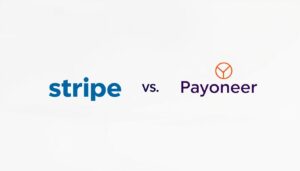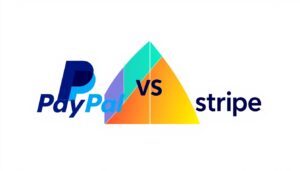Did you know that businesses lose up to 10% of their revenue due to failed transactions? For SaaS businesses, this issue is even more critical. Handling recurring billing, global tax compliance, and multi-currency support can be a nightmare without the right tools.
Generic payment gateways often fall short in addressing these complexities. This is where Karbon FX steps in. Designed specifically for SaaS companies, it simplifies recurring billing, ensures tax compliance, and supports multiple currencies seamlessly.
For example, integrating Karbon FX with platforms like Chargebee enhances subscription management, reducing errors and improving efficiency. Specialized solutions like this are essential for businesses aiming to scale globally without losing revenue.
Key Takeaways
- Failed transactions can lead to significant revenue loss for SaaS businesses.
- Recurring billing, tax compliance, and multi-currency support are critical challenges.
- Karbon FX is tailored to address these specific needs effectively.
- Specialized gateways outperform generic providers in handling SaaS complexities.
- Integration with platforms like Chargebee improves subscription management.
Why SaaS Companies Need Specialized Payment Solutions
The subscription economy is reshaping how businesses operate. With 75% of SaaS revenue coming from subscriptions, automated billing is no longer optional. It’s a necessity.
Over 80% of SaaS businesses rely on recurring models. This creates unique challenges. Traditional one-time payment systems simply can’t keep up.
Compliance is another critical factor. GDPR and local tax laws across 50+ jurisdictions add layers of complexity. Without the right tools, businesses risk penalties and lost revenue.
Specialized solutions like Karbon FX address these challenges head-on. They offer automated dunning and PCI compliance, ensuring smooth operations.
Localized payment methods can boost conversions by up to 30%.
For SaaS companies, the right payment processing tools are essential. They streamline operations, reduce risks, and drive growth.
Key Challenges in SaaS Payment Processing
Handling global transactions efficiently is a top priority for modern businesses. For subscription-based models, recurring billing and cross-border payments present unique hurdles. These challenges can impact customer retention and revenue growth.
Managing Recurring Payments
Recurring billing is the backbone of subscription models. However, gaps in dunning management can lead to 10-15% churn. Failed payments are a major concern, with a 40% risk of losing customers.
Karbon FX addresses this with smart retry logic, recovering 23% of failed payments. Automated subscription updates further reduce errors, ensuring smoother operations compared to manual processes.
Handling International Transactions
Cross-border payments come with their own set of complexities. The industry average FX markup is 3.5%, adding to costs. Karbon FX offers a competitive edge with a 0.5% markup, significantly reducing expenses.
Compliance is another critical factor. Meeting SEPA, PSD2, and RBI mandates ensures seamless operations across regions. This reduces risks and enhances trust with global customers.
| Provider | FX Markup |
|---|---|
| Industry Average | 3.5% |
| Karbon FX | 0.5% |
By addressing these challenges, businesses can streamline operations and improve customer satisfaction. Specialized tools like Karbon FX are essential for scaling globally while minimizing risks.
What to Look for in an International Payment Solution
Choosing the right tools for handling global transactions can make or break your business’s success. For subscription-based models, two features stand out: multi-currency support and low transaction fees. These elements ensure seamless operations and cost efficiency.
Multi-Currency Support
Global businesses need systems that accept 100+ currencies with real-time conversion. This flexibility eliminates barriers for customers worldwide. For example, Karbon FX offers dynamic currency detection, automatically adjusting to the user’s preferred currency.
In India, RBI’s Liberalized Remittance Scheme (LRS) sets limits on INR transactions. A robust system ensures compliance while maximizing transaction efficiency. This is critical for businesses targeting the Indian market.
Low Transaction Fees
Transaction costs can significantly impact profitability. While providers like PayPal charge 3.49% and Wise 0.7%, Karbon FX offers a flat fee of 1.2%. This can lead to a 60% cost reduction for businesses.
Hidden fees, such as those in T+2 settlement cycles, can also add up. Transparent pricing models, like Karbon FX’s, help businesses avoid unexpected expenses. This makes it easier to receive USD payments without unnecessary costs.
- Multi-Currency Support: Essential for global reach and customer convenience.
- Low Transaction Fees: Critical for maintaining profitability and reducing costs.
- Dynamic Currency Detection: Automatically adapts to user preferences, enhancing the checkout experience.
- Transparent Pricing: Avoids hidden fees, ensuring predictable costs.
By prioritizing these features, businesses can streamline operations and scale globally. Specialized tools like Karbon FX are designed to meet these needs effectively.
Karbon FX: A Comprehensive International Payment Solution
With over $2B processed annually, Karbon FX stands out as a robust choice for global businesses. Supporting 85 currencies, it simplifies complex financial operations for SaaS companies and beyond.
One of its standout features is automated GST invoicing. This ensures compliance with local tax laws, reducing administrative burdens. Additionally, its RBI-compliant escrow system adds an extra layer of security for transactions.
A case study highlights its effectiveness. An Indian SaaS firm reduced failed payments by 40% after integrating Karbon FX. This improvement directly boosted their revenue and customer retention rates.
Integration is seamless, with a 72-hour deployment timeline for APIs. This quick setup minimizes downtime and accelerates operational efficiency. Security is also a top priority, with AES-256 encryption and SOC2 certification ensuring data protection.
Karbon FX’s partner ecosystem includes direct sync with Xero and QuickBooks. This integration streamlines accounting processes, making it easier for businesses to manage finances.
- Automated GST Invoicing: Simplifies tax compliance.
- RBI-Compliant Escrow: Enhances transaction security.
- 72-Hour API Integration: Fast and efficient setup.
- AES-256 Encryption: Ensures top-tier data security.
- Direct Xero/QuickBooks Sync: Streamlines accounting processes.
By addressing these critical needs, Karbon FX proves to be a comprehensive payment solution for businesses aiming to scale globally. Its features and integrations make it a reliable choice for handling international payments and ensuring smooth operations.
Comparing Karbon FX with Other Payment Gateways
Selecting the right payment gateway is crucial for businesses aiming to streamline operations and reduce costs. Karbon FX stands out among competitors like Stripe and PayPal, offering unique advantages in transaction fees, settlement times, and efficiency.
Stripe vs. Karbon FX
Stripe is a popular choice for businesses, but it comes with higher costs and slower processes. For INR transactions, Stripe charges 2.9%, while Karbon FX offers a lower rate of 1.5%. This difference can significantly impact profitability for businesses handling high transaction volumes.
Another key distinction is settlement time. Stripe takes 2 days to process payments, whereas Karbon FX provides instant liquidity. This ensures faster access to funds, improving cash flow management.
KYC timelines also favor Karbon FX. While Stripe takes 48 hours for verification, Karbon FX completes the process in just 12 hours. This efficiency reduces onboarding delays and enhances the user experience.
PayPal vs. Karbon FX
PayPal is widely used for cross-border transactions, but its fees are considerably higher. PayPal charges a 4.4% cross-border fee, compared to Karbon FX’s 1.8%. This makes Karbon FX a more cost-effective option for global businesses.
Chargeback ratios also highlight Karbon FX’s reliability. PayPal’s chargeback ratio is 0.3%, while Karbon FX maintains a lower rate of 0.1%. This reduces disputes and improves trust with customers.
Withdrawal speed is another area where Karbon FX excels. PayPal takes 3 days to process withdrawals, while Karbon FX offers real-time access to funds. This ensures businesses can manage their finances more effectively.
| Feature | Stripe | PayPal | Karbon FX |
|---|---|---|---|
| Transaction Fee (INR) | 2.9% | 4.4% | 1.5% |
| Settlement Time | 2 days | 3 days | Instant |
| KYC Timeline | 48 hours | N/A | 12 hours |
| Chargeback Ratio | N/A | 0.3% | 0.1% |
By comparing these features, it’s clear that Karbon FX offers a competitive edge in terms of cost, speed, and reliability. Businesses looking to optimize their payment processes should consider these factors when choosing a gateway.
How to Choose the Right Payment Solution for Your SaaS Business
Efficient payment systems are a cornerstone of successful SaaS operations. With 68% of merchants prioritizing API flexibility, selecting the right tools is critical. A well-designed system ensures seamless transactions, compliance, and scalability.
- UPI/NetBanking Compatibility: Ensures ease of use for Indian customers.
- Auto-Reconciliation for GST Filings: Simplifies tax compliance and reduces errors.
- Mandate Management under NPCI Guidelines: Enhances security and regulatory adherence.
- Multi-MID Routing Capabilities: Improves transaction success rates.
- Prebuilt Plugins for Zoho/Chargebee: Speeds up integration and reduces setup time.
Adopting a Total Cost of Ownership (TCO) approach is essential. This includes evaluating upfront costs, transaction fees, and long-term scalability. Hidden expenses, such as vendor lock-in risks, can significantly impact your budget.
Closed ecosystems often limit flexibility, making it harder to switch providers later.
To avoid these risks, opt for open systems that offer customization and integration options. This ensures your business can adapt to changing needs without disruption.
| Feature | Closed Systems | Open Systems |
|---|---|---|
| Flexibility | Limited | High |
| Integration Options | Restricted | Extensive |
| Vendor Lock-In Risks | High | Low |
By focusing on these factors, you can choose a payment solution that aligns with your business goals. The right software not only streamlines operations but also enhances customer satisfaction and retention.
Best Practices for SaaS Payment Processing
Streamlining payment processes is essential for SaaS businesses aiming to enhance customer satisfaction and retention. A seamless payment process not only boosts conversions but also builds trust with users. Implementing best practices ensures efficiency, compliance, and a superior customer experience.
Optimizing the Checkout Experience
One-click checkouts can boost conversions by up to 35%. To achieve this, businesses should implement RBI’s tokenization standards, such as Karbon Vault, to secure card data. Localizing for Rupay cards and UPI IDs ensures accessibility for Indian customers.
A/B testing the placement of GST fields can further enhance usability. These small adjustments can significantly improve the checkout experience, reducing cart abandonment rates.
Ensuring Security and Compliance
Security is a top priority in payment processing. Requiring PCI DSS 4.0 compliance ensures data protection. Deploying 3DS2 for RBI’s cardless mandates adds an extra layer of security.
Using Karbon FX’s fraud score API helps detect and prevent fraudulent transactions. These measures not only protect businesses but also build customer trust.
| Security Measure | Benefit |
|---|---|
| PCI DSS 4.0 Compliance | Ensures data protection and regulatory adherence |
| 3DS2 Deployment | Enhances security for cardless transactions |
| Fraud Score API | Detects and prevents fraudulent activities |
By focusing on these best practices, SaaS businesses can optimize their payment processes, ensuring both efficiency and security. These steps are crucial for scaling operations while maintaining customer trust.
Conclusion
Scaling globally requires tools that simplify financial operations while reducing costs. Karbon FX stands out as a reliable international payment solution tailored for SaaS companies. With support for 85+ currencies and a 0.5% FX markup, it ensures cost efficiency and seamless transactions.
Its 99.97% uptime SLA guarantees reliability, while prebuilt compliance features cater specifically to Indian businesses. Karbon FX also offers 40% lower fees compared to Stripe and PayPal, along with dedicated INR settlement corridors for faster fund access.
Ready to optimize your operations? Request a free Karbon FX integration audit today and experience the difference firsthand.







